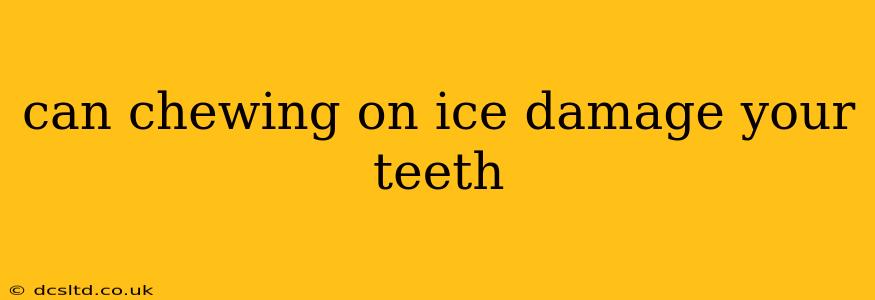Many people enjoy the refreshing crunch of ice, especially on a hot day. But is this seemingly harmless habit actually damaging your teeth? The short answer is: yes, chewing ice can significantly damage your teeth. This seemingly innocent act can lead to a range of dental problems, from minor chips to severe cracks and even tooth loss. Let's delve into the reasons why and explore ways to mitigate the risk.
Why is Chewing Ice Bad for Your Teeth?
Ice is incredibly hard. When you bite down on it with considerable force, the enamel—the hard, protective outer layer of your teeth—is subjected to immense pressure. This pressure can lead to several issues:
-
Cracks and Fractures: The most common consequence is the development of cracks or fractures in your teeth. These can be microscopic at first, but over time, they can worsen, leading to sensitivity, pain, and ultimately, the need for extensive dental work.
-
Enamel Erosion: Repeated chewing on ice gradually wears away the enamel. This weakens your teeth, making them more susceptible to decay, cavities, and sensitivity to hot and cold temperatures.
-
Chipped Teeth: A forceful bite on a piece of ice can result in a noticeable chip in your tooth. This not only affects the aesthetics of your smile but can also expose the sensitive dentin layer underneath the enamel.
-
Increased Sensitivity: As enamel erodes, the dentin becomes exposed, leading to increased sensitivity to temperature changes, sweet foods, and even air.
How Can I Tell if Chewing Ice is Damaging My Teeth?
You might notice several signs that indicate chewing ice is harming your teeth. These include:
- Tooth pain or sensitivity: This is a clear indication of enamel damage or cracks.
- Visible chips or cracks: Inspect your teeth carefully for any noticeable damage.
- Increased sensitivity to temperature changes: If your teeth are unusually sensitive to hot or cold foods and drinks, it could be a sign of enamel erosion.
- Discoloration: Damaged teeth might appear darker or discolored.
What are the long-term effects of chewing ice?
The long-term effects of habitually chewing ice can be quite severe. Ignoring the early warning signs can lead to:
- Extensive dental work: Cracks and fractures might require fillings, crowns, root canals, or even tooth extractions.
- Tooth loss: Severe damage can eventually lead to the loss of teeth.
- Increased dental costs: Treating the consequences of chewing ice can be expensive.
Is there a way to safely chew ice?
Honestly, there's no truly "safe" way to chew ice. The hardness of ice poses an inherent risk to your teeth. The best approach is to avoid chewing ice altogether.
What can I do instead of chewing ice?
Instead of chewing ice, consider healthier alternatives to satisfy that craving for a cool sensation:
- Freeze fruits: Frozen grapes, berries, or bananas provide a refreshing, healthy alternative.
- Ice pops or popsicles: These offer a cool treat without the risk of damaging your teeth.
- Cold drinks: Enjoy a chilled beverage instead of chewing ice.
- Chewing gum: Chewing sugar-free gum can stimulate saliva production, which helps protect your teeth.
Can chewing ice cause other problems besides tooth damage?
While tooth damage is the primary concern, chewing ice can also contribute to temporomandibular joint (TMJ) disorders. The repetitive forceful chewing motion can strain the jaw joints, leading to pain, clicking, and limited jaw movement.
How can I stop chewing ice?
Breaking a habit takes time and effort. Here are some tips to help you stop chewing ice:
- Identify your triggers: Determine what situations or emotions lead you to chew ice.
- Find healthy alternatives: Having healthy alternatives readily available will help you resist the urge.
- Be patient and persistent: It takes time to break a habit, so don't get discouraged if you slip up occasionally.
- Seek professional help: If you're struggling to stop chewing ice on your own, consider seeking help from a therapist or counselor.
By understanding the risks and adopting healthier alternatives, you can protect your teeth and maintain a healthy, happy smile for years to come. Remember, your dental health is invaluable!
